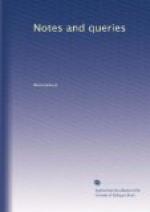“O true nobilitie, and rightly grac’d
With all the jewels that on thee depend,
Where goodnesse doth with greatnesse live
embrac’d,
And outward stiles, on inward worth attend.
Where ample lands, in ample hands are
plac’d
And ancient deeds, with ancient coats
descend:
Where noble bloud combin’d
with noble spirit
Forefathers fames, doth with
their formes inherit.
“Where ancestors examples are perus’d
Not in large tomes, or costly tombs alone,
But in their heires: and being dayly
us’d
Are (like their robes) more honourable
growne, {296}
Where Loyalty with Piety is infus’d,
And publique rights are cherish’d
w’th their owne;
Where worth still finds respect,
good friend, good word,
Desart, reward. And such
is Ricot’s Lord.
“But what make I (vaine voyce) in
midst of all
The Quires that have already sung the
fame
Of this great House, and those that henceforth
shall
(As that will last) for ever sing the
same.
But, if on me, my garland instly fall,
I justly owe my musique to this name.
For he unlawfully usurps the
Bayes
That has not sung in noble
Norrey’s prayse.
“In playne (my honour’d Lord)
I was not borne,
Audacious vowes, or forraigne legs to
use,
Nature denyed my outside to adorne,
And I, of art to learne outsides refuse.
Yet haveing of them both, enough to scorne
Silence, & vulgar prayse, this humble
muse
And her meane favourite; at
yo’r comand
Chose in this kinde, to kisse
your noble hand.”
His Polyhymnia is dedicated to the sister of this person, the Lady Bridget, Countess of Lindsey, and Baroness of Eresbie and of Ricot. Besides the “Anglers’ Song” made at Walton’s request, and the before-mentioned two songs, which are given at length in the Appendix to the Complete Angler, p. 420., Sir H. Nicolas’s edit., besides these, and the verses “on William Shakespeare, who died in April, 1616,” sometimes called “Basse his Elegie on Shakespeare,” which appear in the edition of Shakespeare’s Poems of 1640, 8vo., and are reprinted in Malone’s edition of his Plays, vol. i. p. 470.: another poem by William Basse will be found in the collection entitled Annalia Dubrensia, upon the Yearely Celebration of Mr. Robert Dover’s Olympick Games upon Cotswold Hills, 4to. 1636. This consists of ten stanzas, of eight lines each, “To the noble and fayre Assemblies, the harmonious concourse of Muses, and their Ioviall entertainer, my right generous Friend, Master Robert Dover, upon Cotswold.” Basse was also, as Mr. Collier remarks, the author of a poem, which I have never seen, called Sword and Buckler, or Serving Man’s Defence, in six-line stanzas, 4to. Lond., imprinted in 1602. A copy of this was sold in Steevens’s sale, No. 767., and is now among “Malone’s Collection of Early Poetry” in the Bodleian Library at Oxford. And, according




